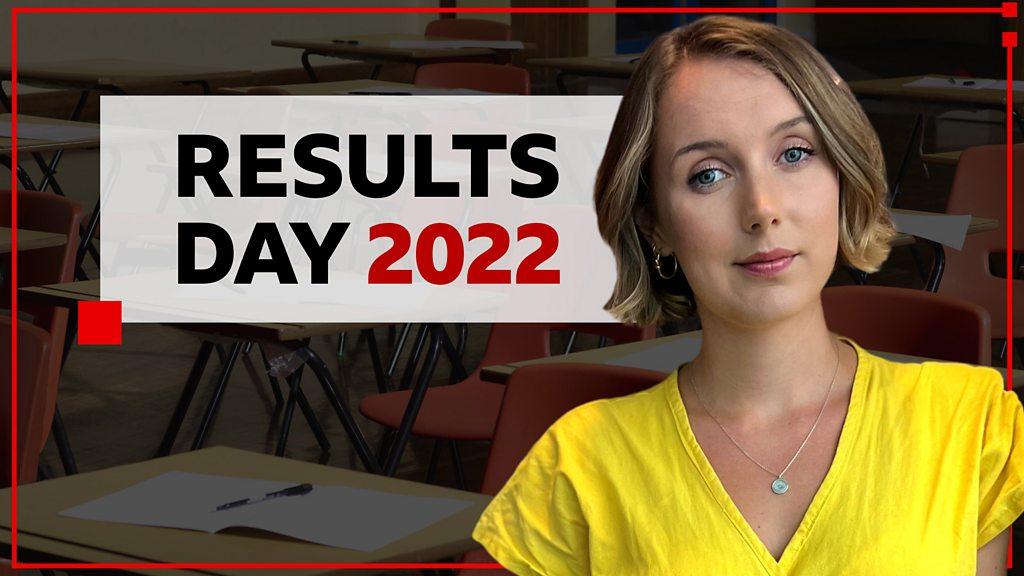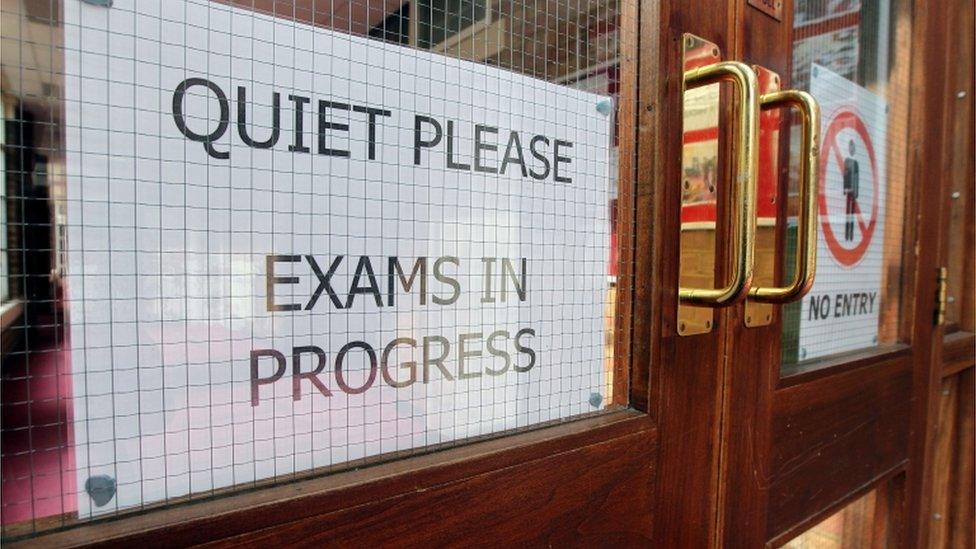A-levels: Wales top grades dip after exams return
- Published
- comments

These students in Swansea got their results on Thursday morning
Top grades at A-level have dipped since 2021, after pupils sat summer exams for the first time in three years.
However, more than 40.9% of grades were A* and A, still well up on the pre-Covid pandemic figure for 2019, when exams were last held.
Thousands of pupils have been receiving AS levels, Welsh Bacc and vocational results, including BTec.
Watchdog Qualifications Wales said grading had been more generous to reflect a "most extraordinary" period.

This year's results follow two years when grades were awarded based on teacher assessments due to the pandemic.
They show:
17.1% of all results were at the highest A* grade, compared with 21.3% in 2021 and 8.9% in 2019
30.7% of AS grades issued were grade A and 92.7% were A-E
6.4% of Advanced Skills Challenge Certificate grades in the Welsh Baccalaureate were A*, 29% were A*-A and 96.7% were A* -E

A-levels saw 85.3% awarded A* to C grades, compared with 89.2% in 2021 - but up from 76% in 2019
98% were awarded A* to E, compared with 97.3% in 2019
The total number of A-level exam entries in Wales this year was 35,499, a decrease of 1.0% from 2021
Entries for history, psychology and physical education were up.
Mathematics saw the biggest fall in entries, down 310, but it is still the most popular A-level subject with 3,796 entries
Entries for English literature, chemistry and Welsh first and second language were also down
Girls outperform boys at A* and A by 0.5 percentage points although boys outperform girls by 1.8% at the very top A* grades
At the A* and A grades, Wales is ahead again of the UK average and has a higher proportion than every region of England, although it is behind Northern Ireland.

A-level results: More coverage
BACKGROUND: How were grades decided?
ANALYSIS: Is university worth it?

Philip Blaker of Qualifications Wales says exams were the fairest system this year
This year's system was designed to bridge the "grade inflation" of 2021 with "normal" grading in 2019.
"Returning to pre-pandemic assessment arrangements was always going to be a big task," said Qualifications Wales chief executive Philip Blaker.
"We know that learners were anxious about the return to exams, but overall, the exam series has gone well, which is an incredible achievement for everyone involved."
Advice on clearing can be found here, external.

Ellie got the grades she needed to get into university
At Caldicot School in Monmouthshire, Ellie, who is heading to Reading to study psychology, got the results she needed.
"It was a really different experience sitting exams for the first time - we had a few in Year 10, but this was obviously different. I'm just glad it's over now. I was nervous but so happy to get in."
Fellow student Tiger, who is hoping to go to Oxford to study classics, also got what she wanted.
"It was definitely a really strange experience, as it had been so long since we last had exams," she said.
"We had to adapt, and there was quite a bit of pressure, but we got through it."

Vinola, Ryan and Zack got their results in Llanelli
At Coleg Sir Gar in Llanelli, Vinola, 18, got two Cs, a D and an A grade. She'll do a foundation course at Carmarthen School of Art from next month.
She said the last two years were hard "physically and mentally".
She added: "The results were better than I expected, specifically in one subject I got an A and I didn't think I could."
Ryan, 18, received three As and a B and will go to Aberystwyth University to study a maths and statistics degree.
"Overall I feel the A-level grades I received represented the work I put in to get them," he said.
Zak, 18, received an A, a B and a C and a pass in the Welsh Bacc, which he was happy with.
He said there was a lot of anxiety leading up to results day, but now he'll be going to Cardiff University so study neuroscience.
'Everything happens for a reason'
Ucas (Universities and Colleges Admissions Service) said 65.3% of students received their first choice university in the UK in 2022.
For those that did not get the results they wanted, Ucas' clearing service said it was important to remain optimistic.
That view was echoed by Alexandra Offer, 22, from Leicester, who did not get into her first choice university on results day in 2018.

Alexandra Offer said she was a prime example of how you can still achieve your dreams even if A-levels do not go as planned
"Leeds was my firm (favourite), and they had rejected me," she said.
"I rang them up and asked if there was any way I could get in and they said 'no, sorry'."
She went to Cardiff University instead.
"I've absolutely loved it, I wouldn't change it for a thing. Everything happens for a reason and obviously Cardiff was the place for me to go," she said.
She is now about to finish her Masters' degree and is about to start a new job.
"For someone today who hasn't got the grades they wanted I'd say 'don't worry about it. I know right now it probably feels like the end of the world, but it really isn't'," she said.
"I'm literally a prime example of (how) you can still be successful and get to where you want to be."
From Kyiv to Cardiff
The A-level revision period was particularly busy for Zorian from Kyiv in Ukraine. While studying for his A-levels at Cardiff Sixth Form College, he was also helping Ukrainian refugees who have settled in Cardiff with day-to-day tasks and translation.

Zorian gained four As in physics, maths, biology and chemistry
"When my A-levels finished, I joined the Armed Forces Military Training Programme over the summer as a translator. Britain now has 10,000 Ukrainian soldiers receiving training from the British Army here in the UK and they need translators and helpers," he said.
He got his A-level results and gained four As in physics, maths, biology and chemistry. This means he can head to Durham University next to study biological sciences.
"I am going to stay in the UK with my godmother who is Ukrainian but lives in London before university," he added.
Cardiff Sixth Form College principal Gareth Collier said the school had received glowing reports from the host family who described him as "an example of an outstanding, selfless individual willing to help others where he can".
'Marked robustly'
Education Minister Jeremy Miles, on a visit to Coleg Sir Gar in Llanelli, said: "We know what a challenging couple of years it's been for students and staff. For everyone involved in ensuring this year's exams could take place, today is reward for all the hard work you have put in."
Kath Thomas, interim chief executive of the Joint Council for Qualifications, added: "As intended, these results are higher than the last set of summer exams in 2019, but lower than last year's teacher-assessed grades.
"This reflects the special arrangements that were put in place to support students, schools and colleges through another challenging year due to Covid."

Results day is above all about the achievements of individual students and what it will mean for what they do next.
And whatever grades they had today, it's a chance to acknowledge the challenges young people have faced in studying under Covid and celebrating just getting through it.
Those in charge of exams have been accused at times of focusing too much on the system rather than people.
So there were risks involved in engineering a midpoint in results between 2019 and 202I, but they seem content with how it's worked out so far.
Covid's impact is still being felt and for next summer's exams there will be information given in advance on what could come up.

What about those exams which were "too difficult?"
Ahead of results day, there were complaints from some teachers and pupils in Wales that some exam papers were too difficult.
But the main exam board WJEC said it was "confident and comfortable" with the qualifications.
Ian Morgan, WJEC chief executive, said the results reflected "the effort and determination" this year's students had shown.
Complaints from pupils and teachers about an AS maths paper during the summer exams led to changes to how it was graded, Qualifications Wales confirmed.
After a review of the paper, the watchdog asked the WJEC exam board to take action and as a consequence "grade boundaries were set lower than would otherwise be the case".
It called mistakes in an A level English language and literature "a significant incident that could have disrupted learner performance". But added they were satisfied that WJEC took appropriate action.
Qualifications Wales added: "In most subjects, lower grade boundaries were needed and in some cases, boundaries had to drop significantly".
On average, at A level, unit grade boundaries went down by 7.7 percentage points at grade A and by 12.3 percentage points at grade E.
It added that "2022 should be considered as a unique year".
"We anticipate that grade boundaries will rise as the impact of the pandemic diminishes and we return to established performance standards"
'Drive pressure into the system'
Qualifications Wales warned the process of going to university will be more competitive this year, especially for courses like medicine and dentistry.
"We think that will drive pressure into the system in terms of getting to their first choice university," Mr Blaker added.
The Universities and Colleges Admissions Service (Ucas) has said it expects more students to be offered a place on their chosen course.

NAHT Cymru director, Laura Doel, said pupils would have experienced disruption because of Covid
Laura Doel, of head teachers union NAHT Cymru, said: "It is important for everyone to remember that some students and some schools will have experienced more disruption due to the pandemic than others, so results should be seen within a personalised context.
"That said, students should be able to feel confident this year that where those results rely on performance in exams, they have been marked and graded consistently across all centres and all students."

HAYLEY PEARCE PODCAST: Tackling the issues that make the group chats go off
SAM SMITH PRESENTS STORIES OF HIV: From Terrence Higgins to today

What if I didn't get my grades?
Students can review. It can carry a charge of £43 if this is not successful, with WJEC saying it only charges if the grade does not change following the review, and it would send an invoice to the school or college.
For learners in Wales, the Welsh government has provided some funding to centres to ensure paying for certain services is not a barrier to learners wanting to request a review.
The education minister said his key message for anyone who didn't quite get the results they wanted, or was unsure of the next steps, was "don't be too disappointed and don't be too hard on yourself".
He added: "There are a wide range of options open to you, including university clearing, apprenticeships, even starting your own business."
He said schools and colleges and organisations such as Careers Wales would support them with the next steps.
- Published18 August 2022

- Published21 May 2022

- Published8 June 2022

- Published6 October 2021

